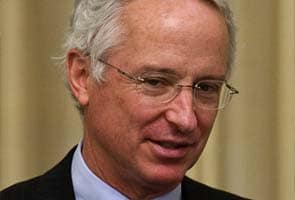
US Ambassador to Pakistan, Cameron Munter. (AP)
Islamabad:
The US ambassador to Islamabad said in remarks broadcast on Saturday that there is evidence linking the Haqqani insurgent network to the Pakistani government, a charge that could raise tensions in an already strained anti-terror alliance between Washington and Islamabad.
The US and NATO blame the Haqqani network for many of the attacks in Afghanistan, including this week's strike on the US Embassy. The group - affiliated with both the Taliban and Al Qaeda - and its army of several thousand fighters is widely assumed to be based just over the Afghan border in Pakistan.
The American officials have long suspected links between the Pakistan military and the Haqqani network.
But needing Pakistani cooperation to beat Al Qaeda and stabilise Afghanistan, they rarely say so publicly and as directly as Ambassador Cameron Munter did in an interview with Radio Pakistan that was broadcast on Saturday.
"The attack that took place in Kabul a few days ago, that was the work of the Haqqani Network," Munter said during the interview. "And the facts, that we have said in the past, (is) that there are problems, there is evidence linking the Haqqani network to the Pakistan government. This is something that must stop."
The army and the government were not available for comment.
The Pakistani army has resisted attacking North Waziristan and the Haqqanis because it believes the group does not pose a direct threat to the country. The army is engaged in a bloody fight elsewhere in the tribal region against militants who have responded with hundreds of suicide bombs around the country in recent years.
Officers say that making enemies of the Haqqanis now could tip the country into even greater turmoil.
The army also believes it will be able to use the group, with which it has ties going back to the US-backed resistance against Soviet rule in Afghanistan, to ensure its archenemy India does not gain a foothold there once the American troops leave.
In a statement Friday at a NATO meeting in Spain, Pakistan Army Chief General Ashfaq Pervez Kayani appeared to allude to that, saying Pakistan had a "sovereign right to formulate policy in accordance with its national interests and the wishes of the Pakistani people."
American is under pressure to show success in Afghanistan ahead of its planned troop withdrawal in 2014, and has been pressing the Pakistani military to take action against the Haqqani network for at least two years, without success. The attack on the Kabul embassy by a team of assailants exposed further tensions in relationship still foundering after the U.S. raid that killed Osama bin Laden in May.
On Wednesday, US Defense Secretary Leon Panetta expressed frustration with Pakistani inaction against the insurgent network and issued what was construed here as a veiled warning that Washington may take unilateral action against the militants. The Foreign Ministry said his remarks were "out of line" with the two nations' anti-terror cooperation.
The US and NATO blame the Haqqani network for many of the attacks in Afghanistan, including this week's strike on the US Embassy. The group - affiliated with both the Taliban and Al Qaeda - and its army of several thousand fighters is widely assumed to be based just over the Afghan border in Pakistan.
The American officials have long suspected links between the Pakistan military and the Haqqani network.
But needing Pakistani cooperation to beat Al Qaeda and stabilise Afghanistan, they rarely say so publicly and as directly as Ambassador Cameron Munter did in an interview with Radio Pakistan that was broadcast on Saturday.
"The attack that took place in Kabul a few days ago, that was the work of the Haqqani Network," Munter said during the interview. "And the facts, that we have said in the past, (is) that there are problems, there is evidence linking the Haqqani network to the Pakistan government. This is something that must stop."
The army and the government were not available for comment.
The Pakistani army has resisted attacking North Waziristan and the Haqqanis because it believes the group does not pose a direct threat to the country. The army is engaged in a bloody fight elsewhere in the tribal region against militants who have responded with hundreds of suicide bombs around the country in recent years.
Officers say that making enemies of the Haqqanis now could tip the country into even greater turmoil.
The army also believes it will be able to use the group, with which it has ties going back to the US-backed resistance against Soviet rule in Afghanistan, to ensure its archenemy India does not gain a foothold there once the American troops leave.
In a statement Friday at a NATO meeting in Spain, Pakistan Army Chief General Ashfaq Pervez Kayani appeared to allude to that, saying Pakistan had a "sovereign right to formulate policy in accordance with its national interests and the wishes of the Pakistani people."
American is under pressure to show success in Afghanistan ahead of its planned troop withdrawal in 2014, and has been pressing the Pakistani military to take action against the Haqqani network for at least two years, without success. The attack on the Kabul embassy by a team of assailants exposed further tensions in relationship still foundering after the U.S. raid that killed Osama bin Laden in May.
On Wednesday, US Defense Secretary Leon Panetta expressed frustration with Pakistani inaction against the insurgent network and issued what was construed here as a veiled warning that Washington may take unilateral action against the militants. The Foreign Ministry said his remarks were "out of line" with the two nations' anti-terror cooperation.
Track Latest News Live on NDTV.com and get news updates from India and around the world

